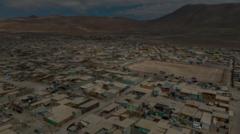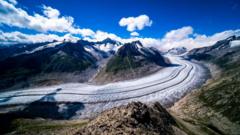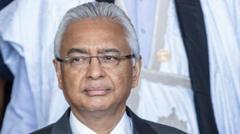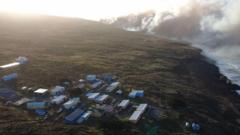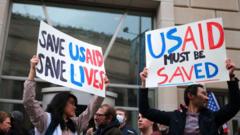A BBC investigation has highlighted allegations of corruption and ineffective management surrounding Shell's oil cleanup efforts in Ogoniland, Nigeria. Despite Shell's claims of progress, evidence suggests significant issues, including fraudulent practices and local suffering, as communities face health risks and environmental degradation.
Whistleblower Exposes Shell's Neglect in Ogoniland Oil Cleanup Efforts
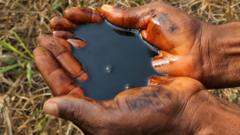
Whistleblower Exposes Shell's Neglect in Ogoniland Oil Cleanup Efforts
Investigation reveals serious allegations of corruption and mismanagement in Shell's oil remediation project in Nigeria's Ogoniland, prompting community concerns and upcoming legal action.
A recent investigation by the BBC has shed light on troubling allegations surrounding Shell's oil cleanup operations in Ogoniland, located in southern Nigeria. Whistleblower accounts indicate that the multinational company's remediation efforts, initiated eight years ago in tandem with the Nigerian government, have been marred by corruption, mismanagement, and negligence, leaving locals to contend with continued health and environmental hazards.
Since the conclusion of a pivotal UN report on the plight of Ogoniland residents over a decade ago, Shell has consistently claimed that their cleanup operations are progressing. However, internal documents and testimonials suggest that the reality is quite the opposite. The $1 billion initiative, largely funded by multiple oil companies, is criticized by many as a "scam" that has squandered valuable resources while neglecting the dire needs of the affected communities.
In anticipation of a civil trial in London's High Court, representatives from two Ogoniland communities, which collectively encompass about 50,000 residents, are expected to present claims against Shell for pollution stemming from its infrastructure between 1989 and 2020. Locals assert that their access to clean water has been compromised, along with their livelihoods tied to agriculture and fishing, due to the persistent oil spills that have devastated their environment.
Shell, which is currently attempting to divest from its Nigerian operations, has denied wrongdoing, attributing the spills to sabotage and theft instead of inadequate management on its part. Nonetheless, many locals express skepticism about these claims, voicing concerns that ongoing oil extraction could continue to threaten their quality of life.
The UN's previous reports have echoed these sentiments, highlighting the grave consequences of oil contamination in the area. Notably, in a 2011 study, it was revealed that residents were drinking water contaminated with concentrations of harmful chemicals at levels far exceeding safety standards. The report suggested that complete remediation would take between 25 to 30 years – a timeline underscoring the depth of the contamination problem.
Evidence gathered by the BBC suggests that representatives of both Shell and the Nigerian government were informed of alleged fraud within the cleanup initiative, known as the Hydrocarbon Pollution Remediation Project (Hyprep). Further investigations have revealed that contracts for the cleanup work were awarded to companies lacking relevant expertise, and inflated project costs were a common occurrence.
The situation in Ogoniland, home to an array of economic activities, including fishing and farming, underscores the broader implications of environmental neglect exacerbated by corporate indifference. Many residents, such as Grace Audi and Paulina Agbekpekpe, recount harrowing stories of family health crises and loss of traditional livelihoods due to the contamination.
As Shell prepares to pass its Nigerian assets to Renaissance Africa, the community remains cognizant of the negative impacts these transitions may have on their communities. Locals are worried that they will continue to face the dual threats of exploitation and environmental disaster, in stark contrast to the financial benefits generated by oil extraction in their region.
Facing an enduring cycle of poverty and neglect, the people of Ogoniland remain resolute in their demands for accountability and a genuine commitment to clean up the land and waters that have borne the heavy burden of profit-driven corporate exploitation for decades.

